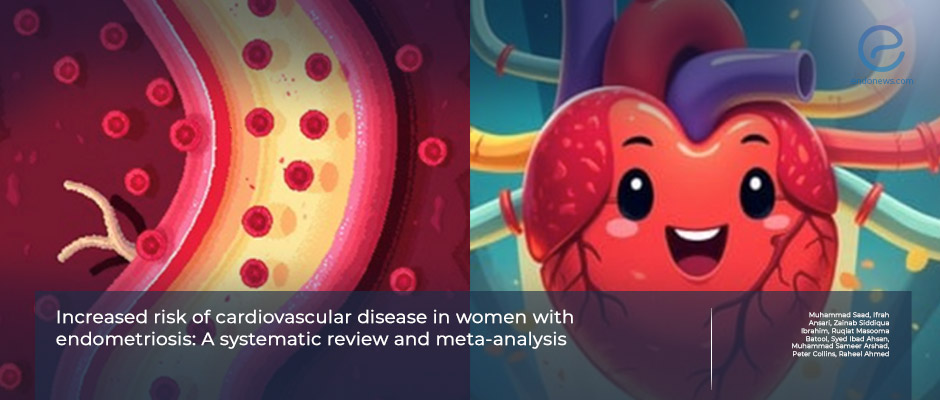Endometriosis as a Cardiovascular Risk Factor: A Comprehensive Meta-Analytic Review
Aug 28, 2025
Endometriosis may be a hidden contributor to women’s heart disease.
Key Points
Importance:
- Endometriosis and cardiovascular diseases (CVD) share overlapping pathophysiological mechanisms, including oxidative stress, chronic inflammation, endothelial dysfunction, and lipid dysregulation.
- Although observational studies have hinted at a connection, comprehensive quantitative evidence has been limited.
Highlights:
- This recent meta-analysis confirms that women with endometriosis face a significantly elevated risk of several major cardiovascular outcomes:
- Strong associations were observed for cerebrovascular disease, ischemic heart disease, arrhythmias, and composite major adverse cardiovascular events.
What's done here:
- This report is a systematic review and meta-analysis conducted by a collaborative team from Pakistan, the UK, and the US.
- Comprehensive searches of PubMed, Scopus, and Cochrane databases between inception–2024 was performed.
- The number of eligible studies was 7 (6 retrospective cohorts, 1 prospective study).
- Risk of bias was assessed using the Newcastle–Ottawa Quality Assessment tool.
- Outcomes pooled using random-effects meta-analysis; results reported with hazard ratios and confidence intervals.
Key Results:
- Pooled data from 4 studies showed a significant statistical association between endometriosis and increased risk of cerebrovascular disease.
- Four studies confirmed an elevated ischemic heart disease risk among women with endometriosis.
- Both arrhytmias and major adverse cardiovascular events outcomes were significantly more common in women with endometriosis.
- No statistically significant associations were found bentween endometriosis and heart failure and mortality.
- Overall, women with endometriosis carried a consistently higher cardiovascular burden, with risks remaining robust across sensitivity analyses.
Strengths and Limitations:
- This is the first meta-analysis to synthesize cardiovascular outcomes specifically in women with endometriosis; rigorous methodology with risk-of-bias assessment and the inclusion of large-scale population-based cohorts enhanced statistical power are the main strengths.
- Heterogeneity in study design and diagnostic criteria; reliance on retrospective data for most outcomes and the absence of addressing the residual confounding factors are the limitations.
From the Editor-in-Chief – EndoNews
"This study delivers a message that should resonate far beyond gynecology: endometriosis is not just a reproductive disease—it is a systemic condition that may elevate women’s lifetime cardiovascular risk. By pooling nearly 1.5 million women across diverse populations, the authors provide the strongest evidence to date that endometriosis is consistently associated with major cardiovascular outcomes, including stroke, ischemic heart disease, arrhythmias, and overall adverse cardiovascular events. The findings are biologically plausible. Endometriosis and cardiovascular disease share common mechanisms—oxidative stress, immune dysregulation, chronic inflammation, and endothelial dysfunction—yet until now, data were fragmented. This meta-analysis consolidates those signals into a clear pattern: women with endometriosis carry a heavier cardiovascular burden, even after accounting for confounders.
Clinically, the implications are profound. Gynecologists and cardiologists alike must recognize that a history of endometriosis warrants careful cardiovascular risk assessment, particularly in midlife when heart disease begins to emerge. Multidisciplinary care—linking reproductive health and cardiovascular prevention—may become a new standard for comprehensive management.
The takeaway is clear: endometriosis belongs on the list of sex-specific cardiovascular risk factors. The challenge ahead lies in translating this recognition into screening, prevention, and ultimately, better outcomes for millions of women worldwide."
Lay Summary
Cardiovascular disease is the leading cause of death among women worldwide, accounting for nearly one-third of all deaths. While traditional risk factors include smoking and diabetes, women also face sex-specific contributors such as polycystic ovary syndrome, hypertensive disorders of pregnancy, and premature ovarian insufficiency. Emerging evidence now suggests that endometriosis may be an additional risk factor for cardiovascular disease.
Saad and colleagues from Dow University of Karachi, Pakistan, conducted a systematic review and meta-analysis, published in the European Journal of Obstetrics & Gynecology and Reproductive Biology, to evaluate this association. They analyzed seven observational studies from five countries, including nearly 1.5 million women. Statistical analyses assessed heterogeneity and adjusted hazard ratios across studies.
The review found that women with endometriosis had an increased risk of major adverse cardiovascular events, ischemic heart disease, cerebrovascular disease, and arrhythmias. However, no clear association was observed with heart failure or all-cause mortality, likely due to the small number of studies addressing these outcomes. Interestingly, some studies noted lower mortality rates among women with endometriosis, possibly reflecting better healthcare access and regular medical follow-up in these cohorts.
The authors highlight shared biological pathways—hormonal imbalance, oxidative stress, immune dysregulation, and atherogenic lipid metabolism—as potential mechanisms linking endometriosis to cardiovascular risk.
In conclusion, women with endometriosis may require a multidisciplinary approach that incorporates cardiovascular risk assessment alongside gynecologic care. These findings emphasize the need for heightened awareness and preventive strategies to address the broader health impact of endometriosis.
Research Source: https://pubmed.ncbi.nlm.nih.gov/40450807/
cardiovascular disease ischemic heart disease stroke women's health arrhythmia dysregulated lipid metabolism endometriosis.

